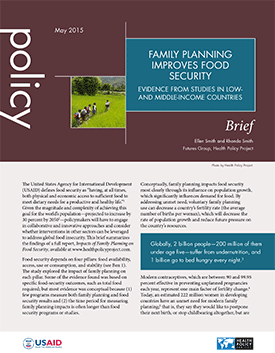The Health Policy Project ended in 2016. Work continued under Health Policy Plus (HP+) until 2022.
PUBLICATION

Author(s): Ellen Smith and Rhonda Smith
Primary Language: English
Date: 5/30/2015
Abstract:
Tackling undernutrition and achieving food security will require cross-sector collaboration, innovative approaches, and optimizing the use of all available interventions. In 2014, the USAID-funded Health Policy Project conducted two reviews of the empirical evidence on the impacts of one intervention—family planning—on food security and nutritional status, respectively.
This brief on food security shows that voluntary family planning can decrease fertility rates and slow the pace of population growth, thus reducing food needs as well as strains on agricultural resources. In this way, family planning supports the four main pillars of food security—availability, access, utilization/consumption, and stability—and can help ensure that people have both physical and economic access to sufficient food.
The accompanying report can be found here, and a companion brief on nutrition is available here.
Also see the companion desk review synthesizing the programmatic experiences of integrating family planning with food security and nutrition. It was conducted by the Food and Nutrition Technical Assistance III Project (FANTA) and is available here: http://www.fantaproject.org/focus-areas/food-security/desk-review-programs-integrating-family-planning-food-security-and-nutrition.
Brief Family Planning/Reproductive Health (FP/RH) Nutrition Global

